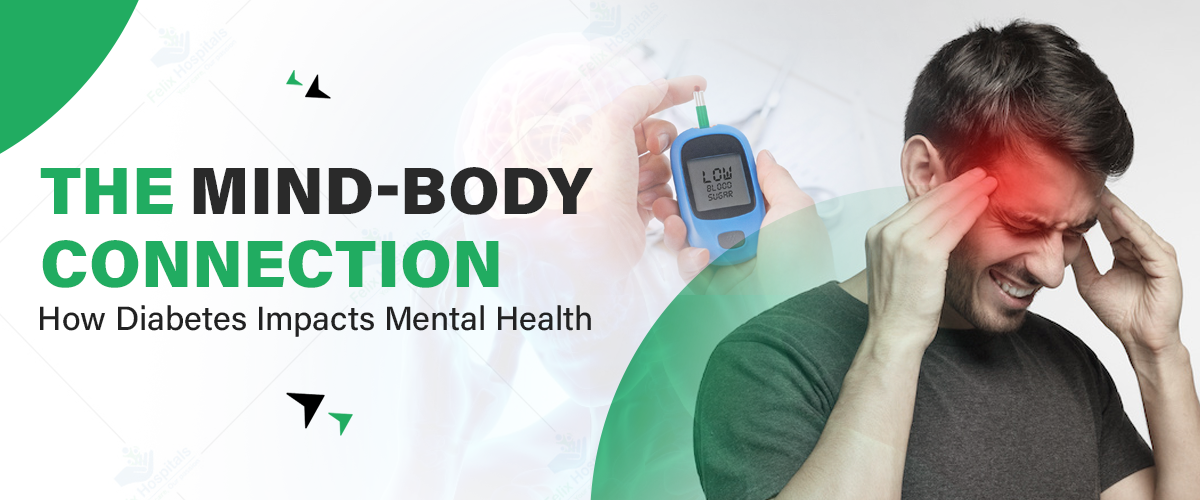
Subscribe to our

Diabetes, a chronic condition affecting millions worldwide, demands consistent management of blood sugar levels and lifestyle choices. While much attention is given to its physical effects, the psychological impact of diabetes often goes unnoticed. Mental health plays a critical role in managing long-term illnesses, and understanding the mind-body connection is vital for overall well-being. With the right care, including support from a diabetes hospital, individuals can find a balanced approach to both their physical and mental health.
If you or someone you know is struggling with diabetes and mental health, seek support today. Call us at +91 9667064100.
Diabetes is categorized into three primary types, each affecting the body differently:
Type 1 Diabetes: An autoimmune condition where the body attacks insulin-producing cells in the pancreas. It requires lifelong insulin therapy and careful monitoring of blood sugar levels.
Type 2 Diabetes: A metabolic disorder often linked to lifestyle factors such as poor diet, lack of exercise, and obesity. It involves insulin resistance and can often be managed through lifestyle changes and medication.
Gestational Diabetes: A temporary condition occurring during pregnancy, posing risks to both mother and child. While it usually resolves after childbirth, it increases the risk of Type 2 diabetes later in life.
Diabetes affects physical health in several ways. Uncontrolled blood sugar levels can damage vital organs, including the heart, kidneys, and eyes, while also increasing the risk of infections.
The mind-body connection highlights the relationship between physical health and mental well-being.
Chronic illnesses like diabetes can create a feedback loop, where physical symptoms worsen mental health, and vice versa.
Stress from living with diabetes can elevate cortisol levels, negatively impacting blood sugar control.
Mental health challenges, such as anxiety and depression, can lead to unhealthy behaviors that complicate diabetes management.
Breaking the cycle requires understanding the connection between physical and mental health.
A holistic approach that addresses both physical and mental health can help manage diabetes more effectively. Lifestyle changes, mental health support, and medical treatment work together to promote better overall health.
Diabetes significantly impacts mental health, manifesting in various ways:
Stress and Anxiety: The psychological burden of managing a chronic condition can be overwhelming. Constant monitoring of blood sugar levels, fear of complications, and lifestyle adjustments contribute to heightened stress and anxiety.
Depression: People with diabetes are at a higher risk of developing depression due to the ongoing challenges and emotional toll of the condition. Depression can further hinder diabetes management, creating a vicious cycle.
Diabetes Distress: This refers to the emotional strain caused by the daily demands of diabetes management, including medication adherence, dietary restrictions, and fear of hypoglycemia or hyperglycemia.
Cognitive Effects: Fluctuating glucose levels can affect brain function, leading to memory issues, difficulty concentrating, and impaired decision-making.
Mental health is a critical factor in effective diabetes management. Here’s how it impacts the condition:
Stress and Blood Sugar Levels: Stress hormones like cortisol can interfere with insulin function, causing blood sugar levels to rise. Chronic stress makes it harder to maintain glycemic control.
Unhealthy Lifestyle Choices: Poor mental health can lead to behaviors such as overeating, lack of physical activity, and neglect of medication, worsening diabetes symptoms.
Emotional Well-being: A positive mental state enhances motivation and adherence to treatment plans, improving overall outcomes.
Addressing both diabetes and mental health through the best care is essential. Seeking support from the Best Hospital for Depression can help individuals manage the emotional challenges associated with diabetes, ultimately improving their quality of life and treatment success.
Managing both diabetes and mental health requires a comprehensive approach. Here are effective strategies:
Lifestyle Adjustments: Adopting a balanced diet, engaging in regular exercise, and prioritizing sleep are fundamental for managing diabetes and mental health.
Mindfulness and Stress Management: Practices such as meditation, yoga, and breathing exercises help reduce stress and improve emotional resilience.
Therapy and Counseling: Professional support can address emotional challenges, providing tools to cope with diabetes-related stress and depression.
Support Systems: Connecting with family, friends, or diabetes support groups fosters a sense of community and shared understanding, alleviating feelings of isolation.
Medical Support: Integrating psychological care with diabetes treatment ensures a holistic approach to health. Combining endocrinology expertise with mental health services can optimize outcomes.
Felix Hospitals offers a multidisciplinary approach to diabetes care, addressing both diabetes and mental health needs. Our team includes:
Dr. Vimal Gupta (Endocrinologist): With years of expertise in diabetes management, Dr. Gupta specializes in creating personalized treatment plans for optimal health.
Dr. Jaideep Gambheer and Dr. Ashima Ranjan (Psychiatrists): These mental health experts provide compassionate care, addressing the emotional challenges associated with chronic illnesses like diabetes.
By combining endocrinology and psychiatry, Felix Hospitals ensures comprehensive care for patients.
Book an appointment with us for integrated diabetes and mental health care, and embark on a journey towards holistic health.
The mind-body connection is crucial in managing diabetes effectively. Diabetes impacts both physical health and emotional well-being, with stress, anxiety, and depression often complicating its management. Addressing mental health challenges can enhance treatment adherence, improve lifestyle choices, and foster motivation for better outcomes.
Taking a holistic approach, including professional support for both endocrinology and mental health, is essential for breaking the cycle of physical and emotional challenges. By prioritizing mental well-being alongside physical health, individuals can lead a healthier, more balanced, and fulfilling life.